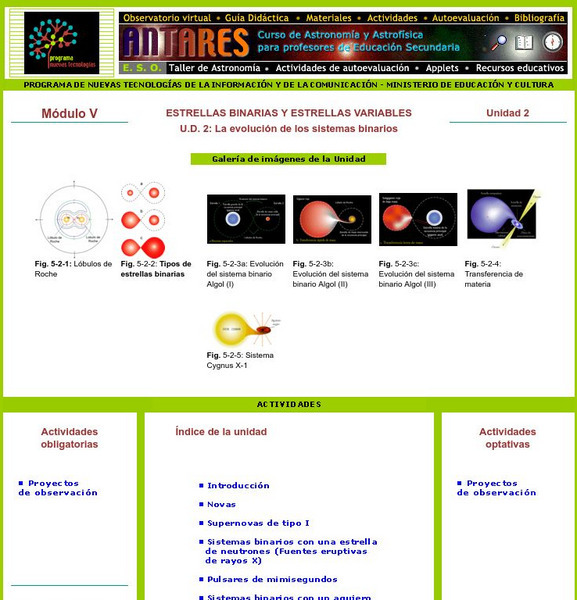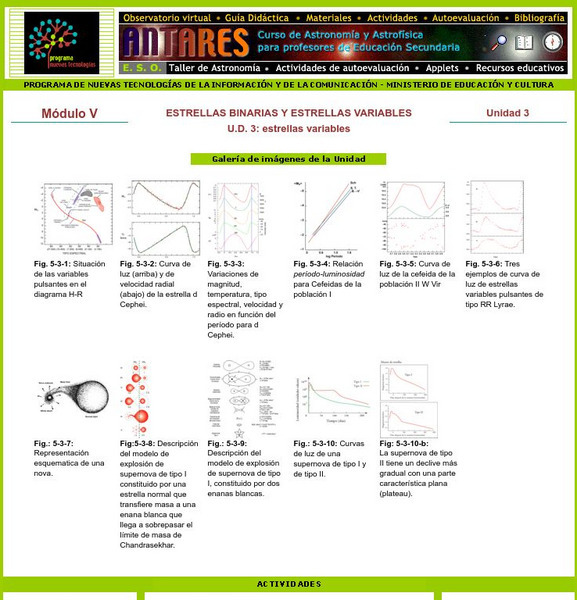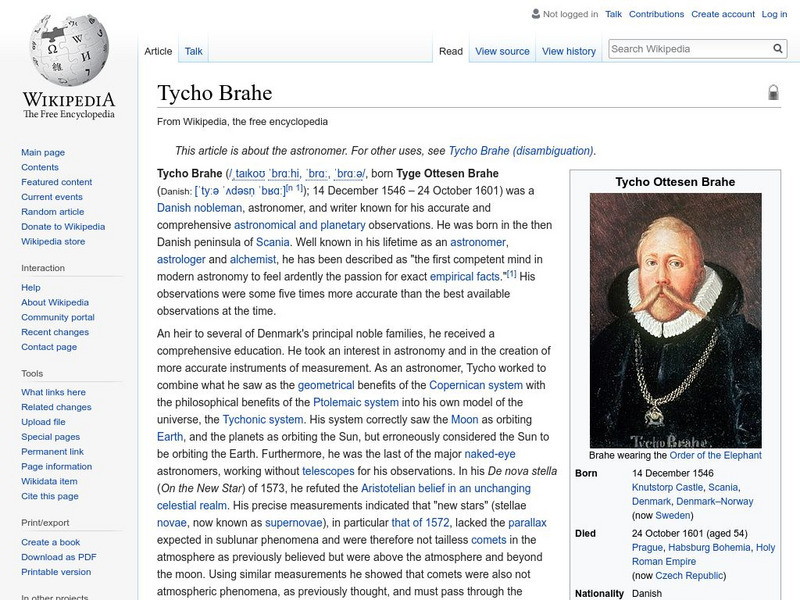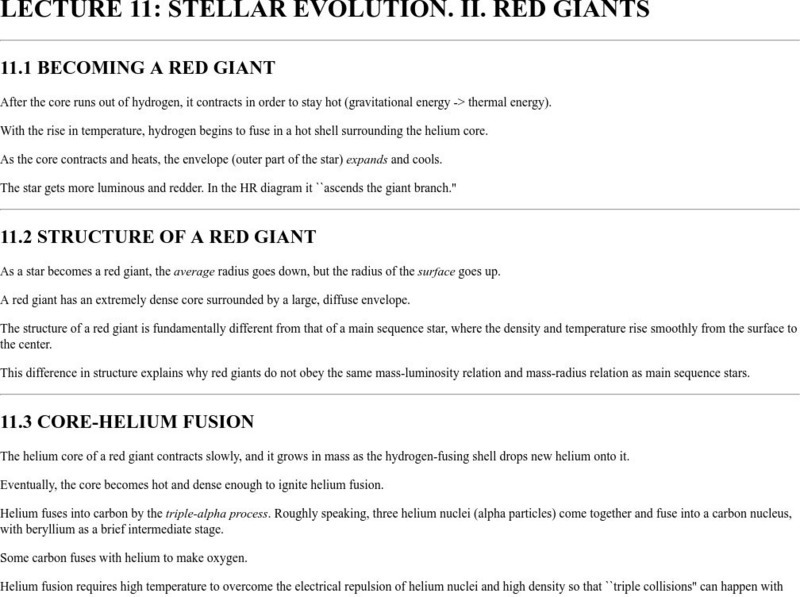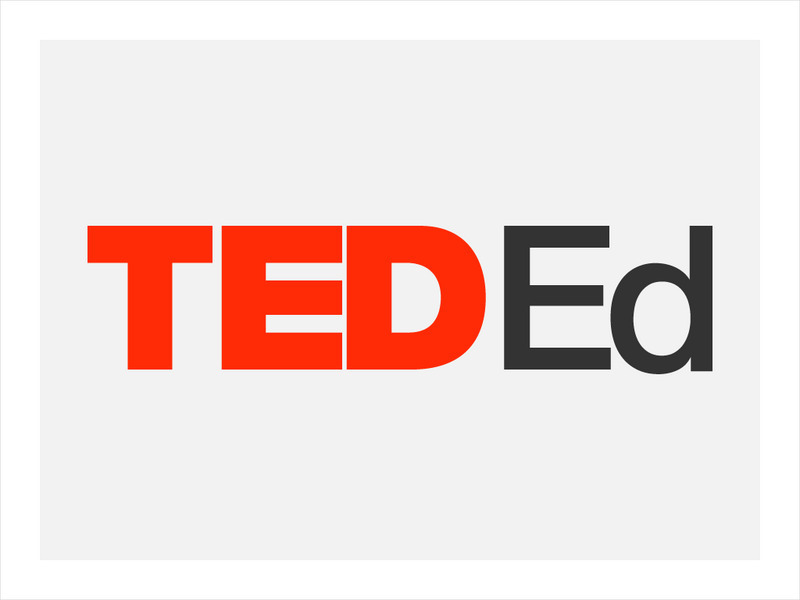Ministerio de Educación (Spain)
Ministerio De Educacion: Espectros Estelares Modulo Ii Unidad 2
In this module you will study the composition of stars. You also will be able to classify them through the virtual observatory.
Ministerio de Educación (Spain)
Ministerio De Educacion: Evolucion Estelar Modulo Iii Unidad 1
In this module you will study the birth, life and death of stars.
Ministerio de Educación (Spain)
Ministerio De Educacion: Fases Finales De La Estrellas Modulo Iii Unidad 2
In this unit you will learn about the final stages of the life of massive stars.
Ministerio de Educación (Spain)
Ministerio De Educacion: Fuentes De Energia Estelar Modulo Iii Unidad 3
In this unit you will learn about stellar energy sources .
Ministerio de Educación (Spain)
Ministerio De Educacion: Medio Interestelar Modulo Vi Unidad 1
In this module you will learn about the interstellar extinction and study about the different types of nebulae and supernova.
Ministerio de Educación (Spain)
Ministerio De Educacion: Nuestra Galaxia, Llamada via Lactea Mod Vii Unit 1
Learn about our galaxy, their mass and the evolution of the various theories about their conception.
Ministerio de Educación (Spain)
Ministerio De Educacion: Cuasares Y Otras Galaxias Activas Modulo Vii Unit 3
In this module you can learn about the active galaxies, quasars and the effect of the gravitational lens.
Ministerio de Educación (Spain)
Ministerio De Educacion: Las Galaxias Modulo Vii Unidad 2
In this module you can learn about galaxies, their morphology classification, masses, distances, etc.
Ministerio de Educación (Spain)
Ministerio De Educacion: Una Estrella Llamada Sol Modulo Iv Unidad 1
In this module you will study the structure and composition of the star closest to us: the Sun.
Ministerio de Educación (Spain)
Ministerio De Educacion: El Sol Activo Modulo Iv Unidad 2
In this module you will learn about the solar cycle and study the possible influence of solar cycles on the Earth's climate.
Ministerio de Educación (Spain)
Ministerio De Educacion: Estrellas Binarias Modulo v Unidad 1
In this module you will learn the different types of binary stars.
Ministerio de Educación (Spain)
Ministerio De Educacion: Estrellas Binarias Y Variables Modulo v Unidad 2
In this module you will study about Novae and Supernovae and will learn about the evolution of the binary system.
Ministerio de Educación (Spain)
Ministerio De Educacion: Estrellas Variables Modulo v Unidad 3
In this module you will learn about variable stars. Here you will find a large gallery of images.
Other
Antique Telescope Society
This is the homepage for the Antique Telescope Society. The page contains information about the organization, notes and images of antique telescopes, selected journal articles, and links to outside resources dealing with astronomy and...
Wikimedia
Wikipedia: Tycho Brahe
A great overview of the life of astronomer Tycho Brahe from Wikipedia Encyclopedia. This article discusses his contributions to the world of astronomy, and his building of his observatory called Uraniborg.
Ministerio de Educación (Spain)
Observaciones Y Modelos en Astronomia
How does the length of the day change? How does the height of the sun change? Do we always see the same star? The answer to these questions and different observations about the sun, the moon and the stars that we can do from earth can be...
Ministerio de Educación (Spain)
Ministerio De Educacion: Astronomia Para Ninas Y Ninos
Learn basic astronomy and travel through space. After you finish the lessons you can take the evaluation to obtain the clues needed to play the fun space games.
Smithsonian Institution
Smithsonian Learning Lab: The Universe, an Introduction
Start with the questions all students ask: How big is the universe, how far away are the planets and stars, how did they form and when, how do they move and why? Build on their natural curiosity. The Smithsonian, in cooperation with...
Ohio State University
Ohio State University: Red Giant Star Lecture Notes
Describes how a star becomes a red giant, the structure of a red giant, core-helium fusion, lifetime predictions, and the position on the HR diagram.
Wikimedia
Wikipedia: The Doppler Effect
This Wikipedia article on the Doppler effect provides an explanation on what it is, information on the first analyzation, and its use in the field of astronomy and radar detection.
Art Institute of Chicago
Art Institute of Chicago: Education: Science, Art, and Technology
Six different on-line lectures, with accompanying lessons and project ideas, that discuss the link between art and science.
TED Talks
Ted: Ted Ed: How Do We Study the Stars?
Yuan-Sen Ting takes us into deep space to show how astronomers study the stars beyond our reach. [4:46]
TED Talks
Ted: Ted Ed: Tycho Brahe, the Scandalous Astronomer
Dan Wenkel dives into the history behind 16th century astronomer, Tycho Brahe explaining how he continued to inspire intrigue even after his death. [4:08]
University of Florida
Baldwin Library: Arcturus or the Bright Star in Bootes by Catharine M. Sedgwick
This is an online photocopy of the original text of the children's book Arcturus, or, The Bright Star in Bootes by Catharine Maria Sedgwick (1865), a fictional story based on factual scientific information.













